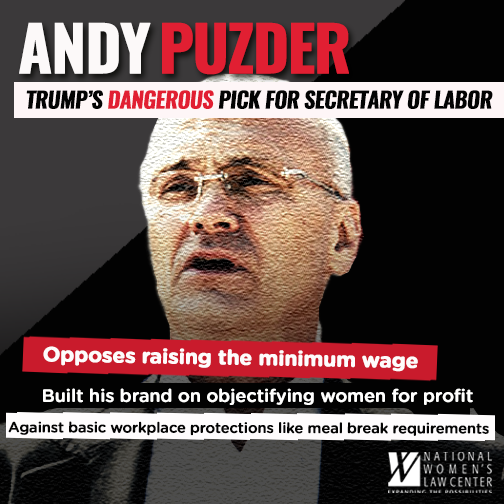Abortion rights, women of color, and LGBTQIA+ people are under attack. Pledge to join us in fighting for gender justice.
Andrew Puzder Won’t Work for Women

This piece originally appeared in US News & World Report on February 8, 2017.
 Only weeks ago, women took to the streets across the country and sent a resounding message: They will hold the Trump administration and Congress accountable for any attempts to turn back the clock on women’s rights. But the Senate, despite delays, may soon consider President Donald Trump’s pick Andrew Puzder for secretary of labor – a man with a problematic record on women that demonstrates he is unfit to serve.
Only weeks ago, women took to the streets across the country and sent a resounding message: They will hold the Trump administration and Congress accountable for any attempts to turn back the clock on women’s rights. But the Senate, despite delays, may soon consider President Donald Trump’s pick Andrew Puzder for secretary of labor – a man with a problematic record on women that demonstrates he is unfit to serve.
Puzder, the CEO of CKE Restaurants, put the Carl’s Jr. and Hardee’s brands on the map by pushing the envelope to see how close burger commercials could get to soft-core pornography without being banned from network TV. He embraced raunchy ad campaigns that featured, in his words, “beautiful women eating burgers in bikinis,” who hosed themselves down, rode mechanical bulls and straddled bags of burgers. A company press release trumpeted, “We believe in putting hot models in our commercials, because ugly ones don’t sell burgers.” Despite the criticism that followed, Puzder embraced the ads as an extension of himself, stating that they “[took] on my personality” as CEO.
Puzder may have been proud of the ads, but it seems he didn’t consider their impact on the women who work for him. Women working in the restaurant industry, including in fast food, experience extraordinarily high levels of sexual harassment from customers, co-workers and managers. According to a 2016 survey by Hart Research Associates, 40 percent of female fast-food workers are sexually harassed.
Given the company’s brand identity, it is not surprising that women working at CKE Restaurants appear to experience harassment at even higher rates. Restaurant Opportunities Center United found that among women working at CKE Restaurants who responded to its recent survey, a full two-thirds had experienced sexual harassment, with harassment by customers being the most common form. The survey quotes a woman who states, “Customers have asked why I don’t dress like the women in the commercials.”
In addition, sexual harassment cases filed against CKE Restaurants during Puzder’s tenure show a repeated pattern of women experiencing crude comments and touching at the hands of co-workers and supervisors, and, if the women complained, managers who failed to take any action to address the harassment. Moreover, a recent analysis by Capital & Main found that CKE’s Carl’s Jr. and Hardee’s restaurants had more federal harassment and discrimination lawsuits filed against them than any other fast food burger chain since 2000, when Puzder became CEO. Given this record, it is not surprising that Puzder has sung the praises of automation, noting that unlike employees, robots don’t file discrimination lawsuits.
Puzder’s record makes clear that he should not be entrusted with the enforcement of laws protecting working women from sexual harassment and assault. In addition, his long and consistent opposition to any significant increases in the minimum wage and his hostility to robust enforcement of wage and hour laws are bad news for women, who make up about two-thirds of minimum-wage workers. Increasing the minimum wage is one important tool for closing the gender wage gap, as women will disproportionately benefit from such an increase, but Puzder stands against it.
Less well-known is Puzder’s role as a leader and strategist in the anti-abortion movement. A self-identified member of the religious right, in the 1980s he was instrumental in the passage of a radical – and unconstitutional – law in Missouri that bestowed legal personhood on embryos from the moment of conception, designed to give the Supreme Court a tool to reverse Roe v. Wade. He has stated he will do whatever he can to make abortion illegal and called the murder of clinic workers inevitable. “The Supreme Court has lifted abortion out of the political debate,” he stated in a 1995 article in the Boston Herald. “Violence has always been politics by other means.”
As an attorney, he also defended abortion protesters who were repeatedly arrested for trespassing on clinics; he argued that the criminal trespass law should not be applied to them, because they believed they were preventing a greater crime.
This record of elevating fetal rights over women’s rights suggests that as secretary of labor, Puzder could subvert pregnant women’s workplace rights in the name of so-called fetal protection, allowing employers to push pregnant women off the job if they claimed they were doing so to protect her fetus. His arguments, that religious or moral beliefs provide a license to break the law, suggest that he might allow corporate employers to opt out of critical anti-discrimination protections and workplace standards, as long as they offered up a religious or moral excuse for doing so – a move that would be to the detriment of workers whose rights depend on those laws.
Finally, domestic violence allegations against Puzder raise real concerns. While his ex-wife has recently recanted the allegations of assault she made against him in the 1980s, he himself has admitted that their arguments resulted in police intervention on two occasions. Given the Department of Labor’s role in enforcing important workplace rights for survivors of domestic violence, such as the right for those employed by federal contractors to take time off to address legal or medical needs, Puzder’s own history merits scrutiny.
Puzder’s record makes one thing unmistakable: The Senate should refuse to put the Department of Labor in his hands. Working women can’t afford it.




